When a two year old boy named Ignatius Sancho arrived in England in 1731, an orphan and a slave, it would have been hard for anyone to have imagined that we would still be talking about him nearly 300 years later.
Yet that small boy was to make a mark on history, not just because he was the first man of African descent to vote in a British election, but because, as the historian Françoise Le Jeune has said, he was ‘a compliant man, having assimilated the keys of success in eighteenth-century England’.
So what did it take for an African man to make a success of his life in eighteenth-century England?
A bit of luck
One cannot completely ignore the luck that the young, uneducated Sancho had in meeting the philanthropic John, duke of Montagu when he was still a boy. Later, Sancho would describe his life prior to this meeting as ‘…unlucky, as I was placed in a family who judged ignorance the best and only security for obedience’. Montagu changed all of that, and Sancho’s visits to the duke’s library allowed him to immerse himself in the music, poetry, theatre, literature and art that would mould his future.
The duke’s interest in Sancho was, to some extent, self-serving; he had made it his mission to prove that African men were just as capable and intelligent as their European cousins, and Sancho was not the first young black boy that the duke had assisted. He was, however, one of his most successful, teaching himself not only to read and write, but also the etiquette skills that would serve him well later in life.
Was Sancho simply part of an experiment? Perhaps, but the relationship that developed between the English nobleman and the African slave was much more than that of patron and protégé and lasted for the rest of Montagu’s life and beyond. That achievement relied on a great deal more than luck.
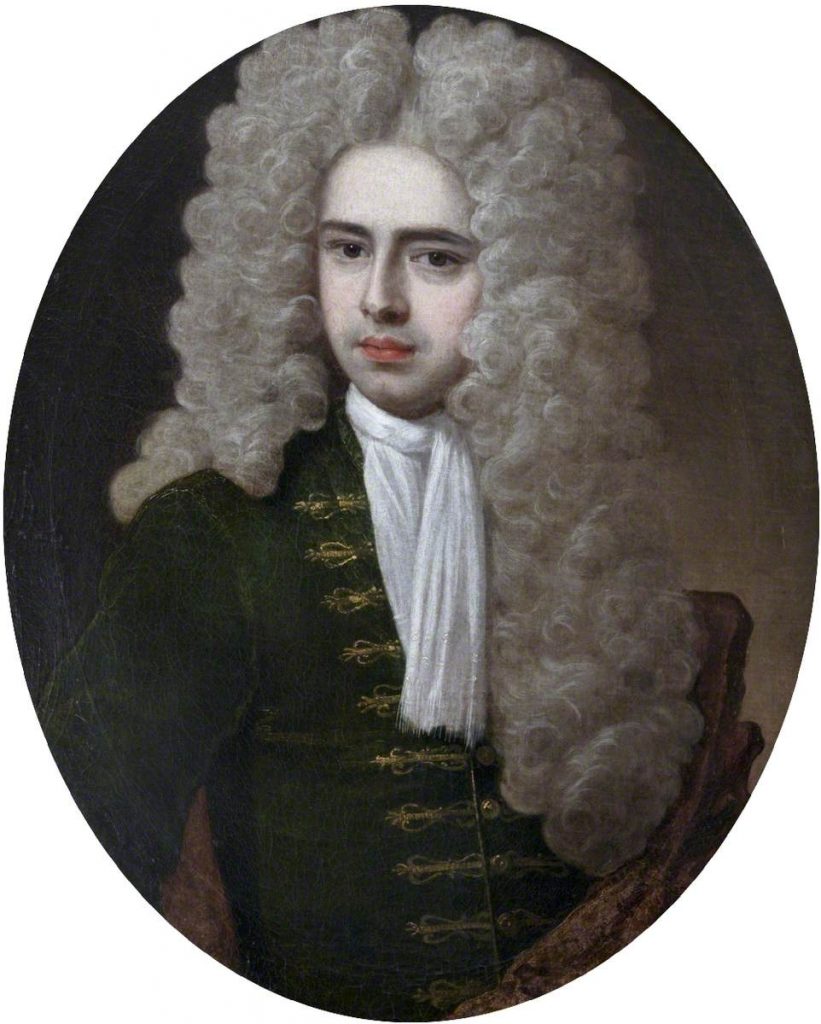
Toeing the line
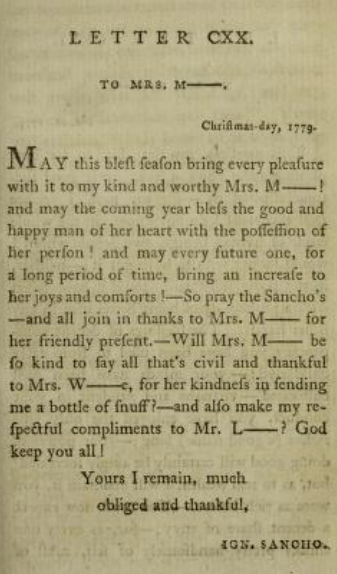
Without question, Sancho knew when and how to show deference. The Georgian society in which he existed was prejudiced not only along racial grounds, but also on class, and they expected reverence from anyone from a lower social order. His acquaintance with the duchesses of Queensbury and Northumberland would certainly have revolved around his ability to be deferential and would not have lasted had he not been. Only John, duke of Montagu, would have appreciated the young Sancho for his ‘native frankness of manner’.
Le Jeune has indicated incidences of where Sancho seems to sign his letters in ways that made his status obvious:
‘I am, as much as a poor African can be, sincerely Yours to command’. (4 October 1775)
Yet this letter was addressed to a close friend and godmother to his son, Lydia Leach, and is therefore not intended to display as much subservience as we may think. The majority of his letters are signed as one friend to another, without the need for deference, and the historian Vincent Carretta has noted his appeal rested in ‘the ease and respect with which he communicates with his correspondents, no matter how much they differ from him in age or social status’.
His letters also show that he had a strong patriotism for his adopted country and was very much a royalist. His career as a grocer relied heavily on Britain’s success at sea and, to some extent, the ongoing slave trade, and whilst it would be too much to say that he supported slavery, he certainly could not afford to criticise it; his customers were often rich because of the slave trade and openly criticising them or slavery would have ruined him.
Instead, Sancho used his letters to compliment his customers, pass pleasantries with his friends and discuss the topics of everyday life, his most famous being his recount of the Gordon Riots in June 1780:
‘Government is sunk in lethargic stupor—anarchy reigns—when I look back to the glorious time of a George II. and a Pitt’s administration—my heart sinks at the bitter contrast. We may now say of England, as was heretofore said of Great Babylon—”the “beauty of the excellency of the Chaldees—is no more;”—the Fleet Prison, the Marshalsea, King’s- Bench, both Compters, Clerkenwell, and Tothill Fields, with Newgate, are all slung open;— Newgate partly burned, and 300 felons from thence only let loose upon the world.’
A model English gentleman and the question of slavery
A significant symbol of his metamorphosis into an English gentleman is the portrait made of him in 1768. Painted by one of the leading portrait artists of his generation, Thomas Gainsborough, it shows Sancho posed as a respectable, educated member of the middle-classes, a far cry from the slave he had once been and the traditional image of a black man in English portraiture. Though paid for by the duke of Montagu, it was the image that Sancho wanted to portray to the world.
But can we, or should we, blame Sancho for any of this?
Sancho was very much like any other man looking to make his way in eighteenth-century England. He was playing by the rules of the game in which the wealthy held all of the power, and railing against the hierarchy would get him nowhere. Yet he was very much aware of his good fortune and of the cruelty of slavery, as shown in a letter to his friend and fellow black man, Julius Soubise, in 1772:
‘Look round upon the miserable fate of almost all of our unfortunate colour. Superadded to ignorance, see slavery, and the contempt of those very wretches who roll in affluence from our labours…’
To others, however, he held his peace and rarely wrote on the topic, though his friendship with the famous author, Laurence Sterne was founded on his appeal to him to write something against slavery in order to ‘ease the yoke (perhaps) of many’.
Sancho toed the line and served his ‘betters’ with deference not only for personal gain, but also to help others. He mentored at least two black boys in London, Soubise and Charles Lincoln, plus he assisted others where he could, often begging his friends for help on their behalf:
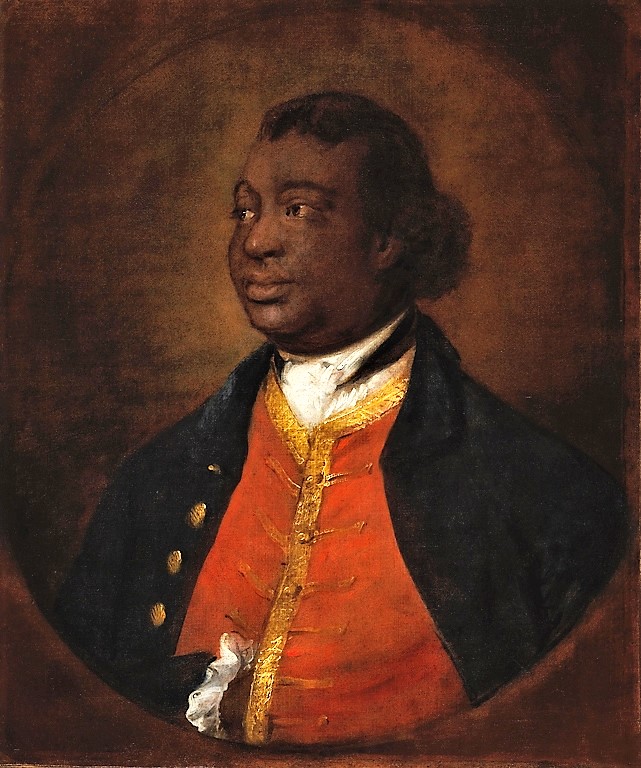
‘A very miserable undone poor wretch, who has no portion in this world’s goods but honesty and good temper, has a child to maintain, …has applied to me. Now, my dear M____, I know you have a persuasive eloquence among the women – try your oratorical powers…Mind, we ask no money – only rags – mere literal rags.’ (17 September 1768)
It is easy to criticise Sancho for his deference, but it was an essential ingredient in his success, particularly as an African man. It enabled him to retain his position in society and to achieve far more for both himself and others than would have been possible if he had criticised the hierarchical society in which he lived.
Friend and mentor
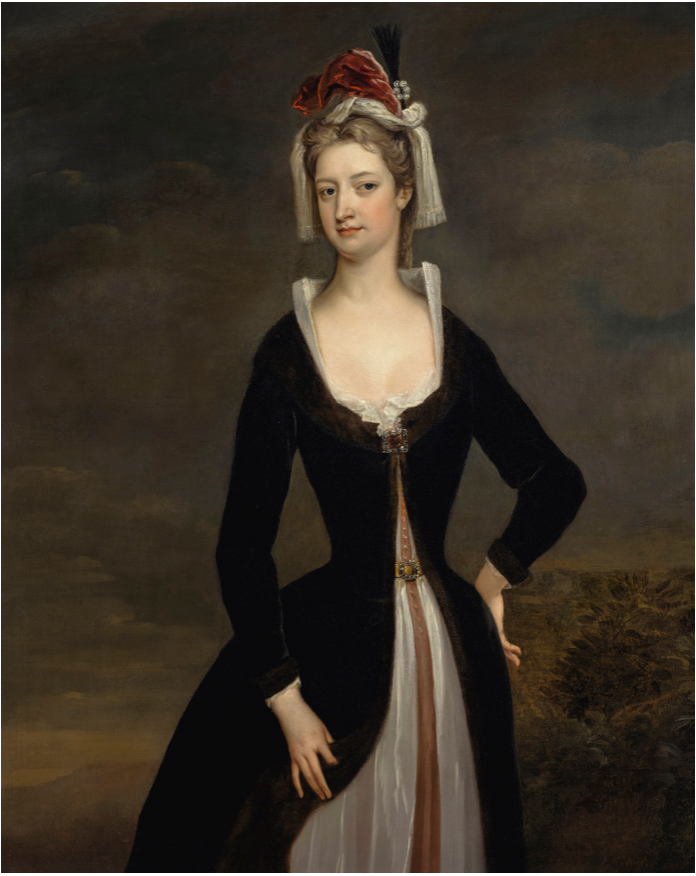
By the time that Sancho cast his vote in the general election of 1774, he had developed a circle of friends and acquaintances that spanned all classes of British society from servants to duchesses.
For some, the African businessman, composer and man of letters would have been no more than a curiosity; however, for others, the draw was more deeply and genuinely felt.
Sancho was intellectually interesting, attracting numerous performers, artists and literary names into his circle. As well as Sterne, he also knew the actor David Garrick, the artist John Hamilton Mortimer, the anti-slavery campaigner Jabez Fisher and the politician (and Britain’s first Foreign Secretary) Charles James Fox. Most interestingly, some of these not only showed Sancho their work, but sought his opinion on them, such as the aspiring author George Cumberland, who stated that Sancho was ‘said to be a great Judge of literary performances’. His mentorship of writer and artist John Meheux and writer John Highmore made him the eighteenth-century’s only black patron with white protégés.
His other great attribute was that he was charismatic.
Whether it was through the threat of suicide or not, he was able to persuade Mary, duchess of Montagu, to take him into her household after the death of her husband in 1749. Although she refused at first (he was, after all, still the ‘property’ of his owners), she changed her mind and employed him as her butler, freeing him from the life of slavery. Only two years later she left him a considerable sum of money and an annuity in her will that saw him comfortably provided for; a mark of gratitude for his service, or perhaps even friendship.
John’s successor as the duke of Montagu, George Brudenell, also formed a bond with Sancho that began as servant and master and yet progressed to something more. Sancho worked as his valet from 1766 until ill-health forced his retirement in 1773, and it was the duke’s generous financial gift that allowed Sancho to elevate himself to a man of independent means, which, in turn, gave him the vote.
His deep affection for his friends and relatives is clear throughout his letters, often beginning with an outpouring of concern for the recipient’s health and ending with more than simple regards:
‘I am, with pride and delight, your true friend.’
His affection was often reciprocated, making his life in Britain successful on both a personal and professional level.
Sancho began his life as a victim of the vicious slave trade, but he ended it as a business man, composer, writer and mentor in his adopted country. Throughout his life he lived with a double identity: the English gentleman reflected in Gainsborough’s famous portrait of him, but also an African man facing the prejudices of a racist society. He balanced these through luck, deference and his genuine charm, living a short but happy life among the artistic literati of London society and a wide and loving group of friends.
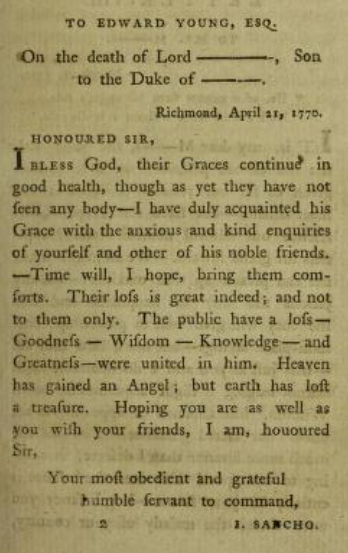
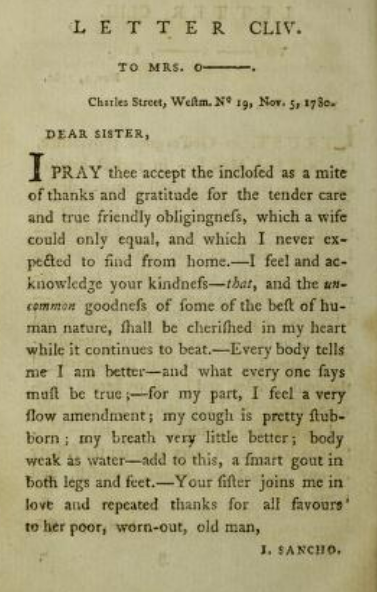
Further Reading
Carey, Brycchan. Ignatius Sancho: African Composer and Man of Letters
Carey, Brycchan. The extraordinary Negro’: Ignatius Sancho, Joseph Jekyll, and the Problem of Biography, British Journal for Eighteenth-Century Studies, 26 (2003)
Carretta, Vincent. Sancho (Charles) Ignatius, Oxford Dictionary of National Biography, 2021
Le Jeune, Françoise. Of a Negro, a Butler and a Grocer (Jekyll 7) – Ignatius Sancho’s epistolary contribution to the abolition campaign (1766-1780), Dans Études Anglaises 2008/4 (Vol. 61), pp440-454
Sancho, Ignatius. Letters of the late Ignatius Sancho, an African. 1784